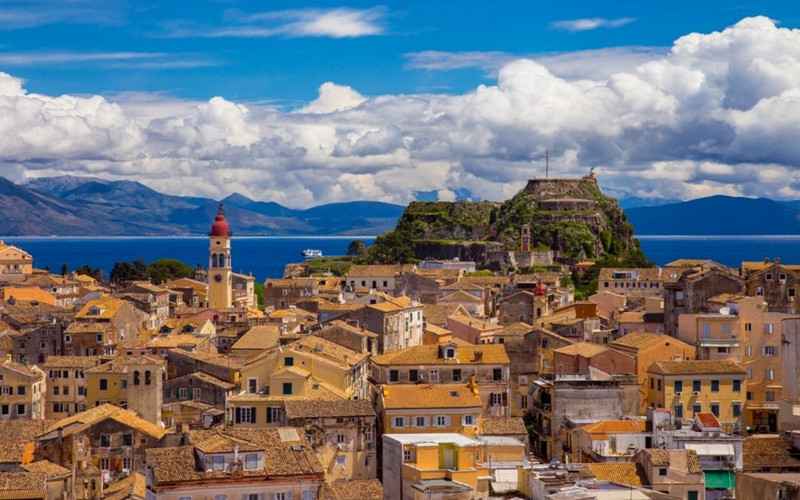Mythical Beginnings: Poseidon’s Generosity

The roots of Corfu trace back to Greek mythology, where the island is believed to be a gift from Poseidon, the god of the sea, to his son Phaiax. The name “Corfu” is thought to originate from the Greek word “Koryphai,” meaning peaks, underscoring the island’s mountainous terrain. This mythical connection adds an extra layer of allure to Corfu’s history.
Geopolitical Gem: Gateway to the Adriatic
Corfu’s strategic location has rendered it a coveted possession throughout the ages. Situated at the entrance of the Adriatic Sea, the island has served as a strategic stronghold for various civilizations, including the Greeks, Romans, Venetians, French, and British. The imprint of these diverse cultures is evident in Corfu’s architecture, customs, and culinary traditions.
UNESCO Acknowledgment: Old Town of Corfu
Since 2007, Corfu’s Old Town has been recognized as a UNESCO World Heritage site, highlighting the island’s historical importance. With a fusion of Venetian, French, and British influences, the town’s architecture stands as a well-preserved example of European urban planning. A stroll through its narrow streets unveils historic landmarks, lively markets, and charming squares.
Achilleion Palace: Ode to Greek Mythology
Commissioned by Empress Elisabeth of Bavaria, also known as Sisi, the Achilleion Palace is a majestic neoclassical mansion on the island. Adorned with statues and artwork depicting Greek mythology, especially scenes from the life of the hero Achilles, the palace’s gardens offer breathtaking views of the Ionian Sea and the surrounding landscapes.
Kanoni and Mouse Island: Breathtaking Panorama
Kanoni, a scenic area on Corfu, provides one of the most iconic vistas on the island. Visitors can gaze across the sea to Pontikonisi, or Mouse Island. The Vlacherna Monastery, situated near Kanoni, and the small church on Mouse Island create a picturesque scene synonymous with the beauty of Corfu.
Corfu’s Unique Easter Celebration
Corfu’s Easter festivities stand out as one of the most vibrant and distinctive in Greece. On Holy Saturday, locals toss clay pots from their balconies, symbolizing the end of winter and the onset of spring. Easter Sunday features a grand procession in Corfu Town, showcasing the “Epitaphios” (a decorated bier symbolizing the tomb of Christ), accompanied by solemn rituals and music.
Liston Promenade: A Stroll Through History
The Liston Promenade, an elegant esplanade in Corfu Town, reminiscent of Paris’s Rue de Rivoli, was constructed during the Napoleonic era by the French. Lined with arcaded terraces, sophisticated cafes, and vibrant shops, Liston is a favored spot for locals and visitors to enjoy a leisurely stroll, sip coffee, and absorb the charming ambiance.
Corfu’s Culinary Delights
Corfu’s cuisine is a delightful fusion of Greek, Italian, and British influences, mirroring the island’s diverse history. Local specialties such as Sofrito, a slow-cooked veal dish with a unique garlic sauce, and Bourdeto, a spicy fish stew, showcase the richness of Corfu’s culinary heritage. Olive oil, kumquat liqueur, and Corfu honey further contribute to the island’s flavorful offerings.
Angelokastro: The Medieval Stronghold
Perched atop Corfu’s highest peak, Angelokastro, or the Angel’s Castle, is a medieval fortress with a storied past. Originally constructed by the Byzantines, the castle served as a defensive bastion against invaders. The breathtaking views from Angelokastro provide a panoramic outlook over the Ionian Sea and the lush landscapes that define Corfu.
Kumquat Delicacies: A Taste of Corfu
Corfu is renowned for its cultivation of kumquats, small citrus fruits thriving in the island’s favorable climate. Kumquat orchards near the village of Nymphes yield a variety of products, including jams, liqueurs, and sweets. The distinctive flavor of Corfu’s kumquats adds a unique touch to the island’s culinary offerings and serves as a delightful souvenir for visitors. Corfu, with its mythical origins, historical significance, and natural beauty, continues to enchant those who explore its shores. From the UNESCO-listed Old Town to the captivating views of Mouse Island, every corner of Corfu narrates a tale of a diverse and rich past. Whether traversing ancient castles, promenading through elegant avenues, or savoring the island’s distinctive cuisine, visitors to Corfu embark on an immersive experience that transcends the picturesque landscapes — it’s an expedition into an island shaped by the currents of history and myth.